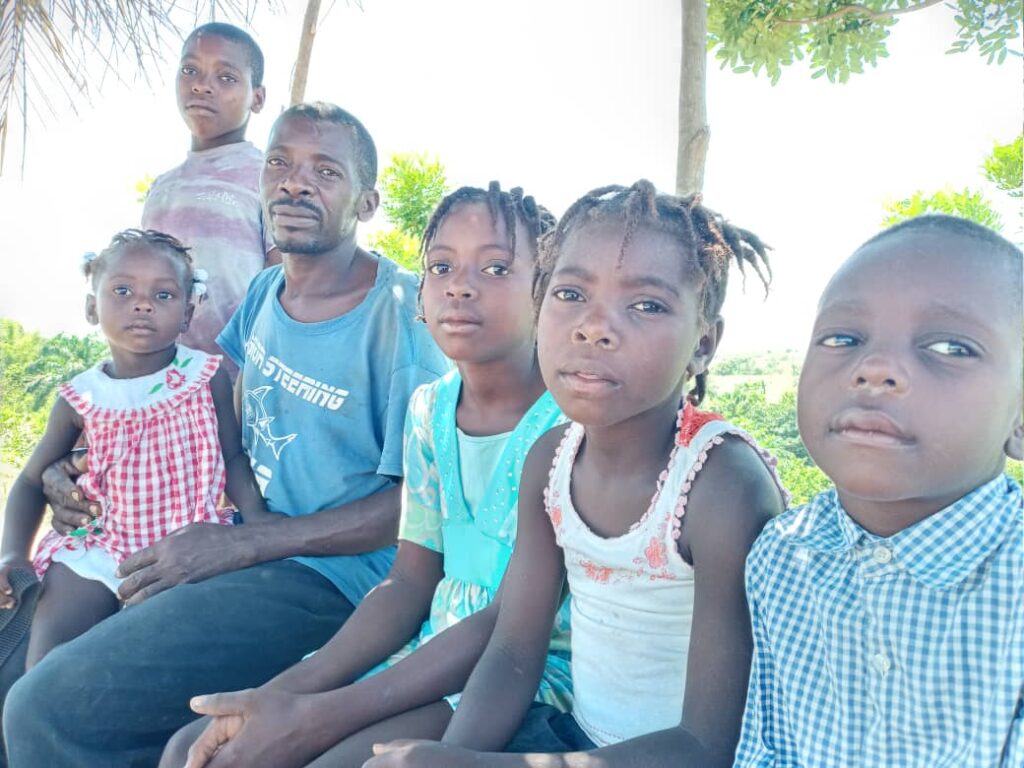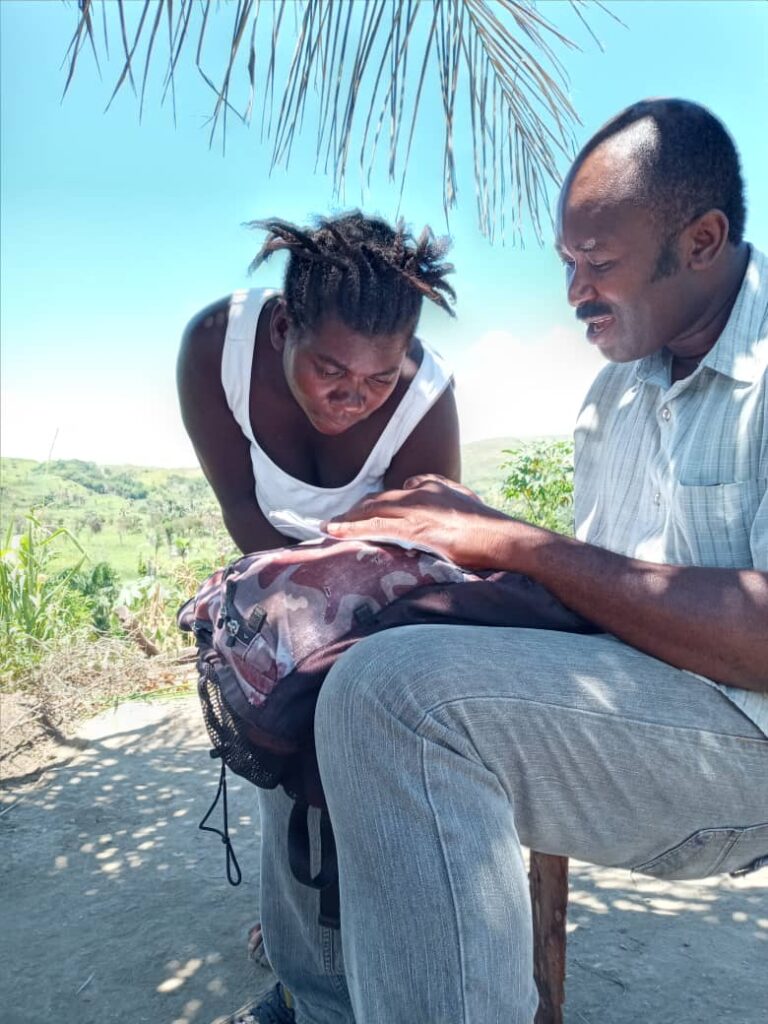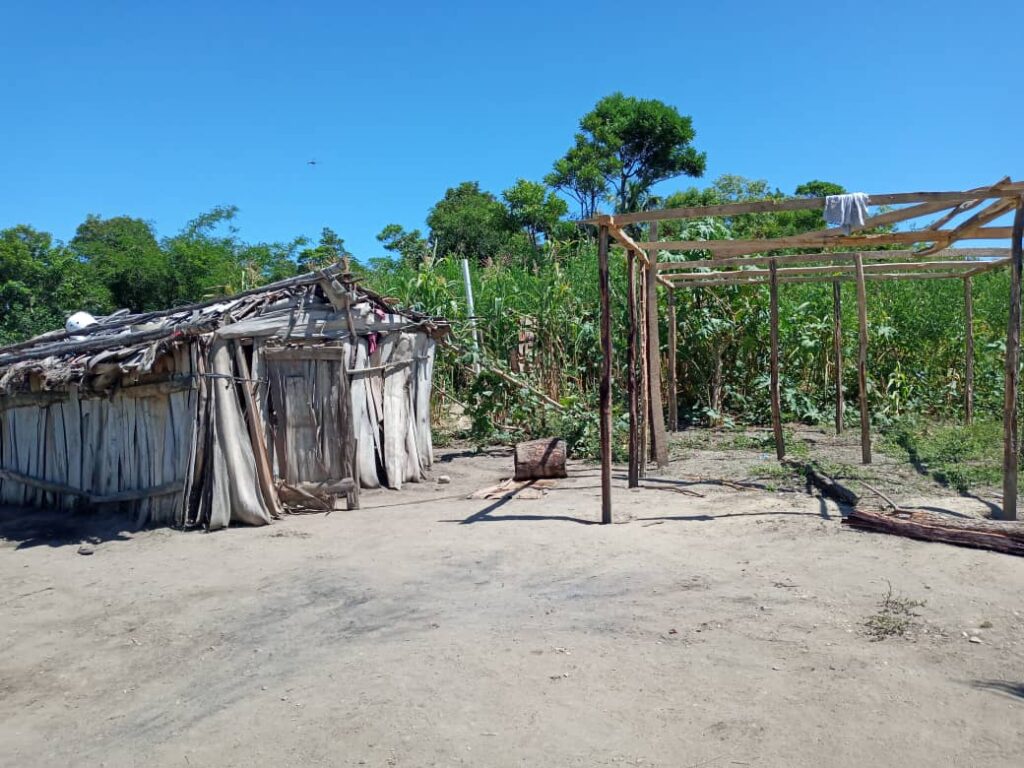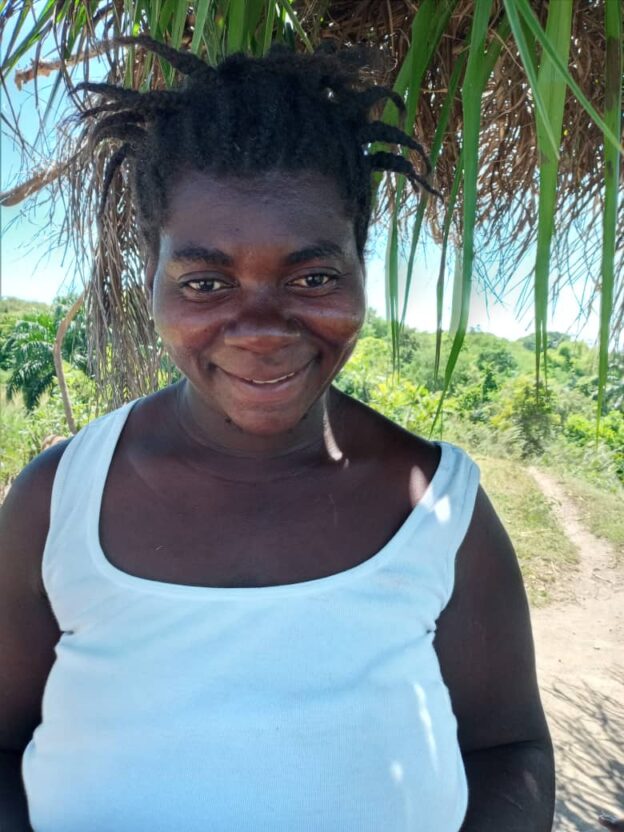After seven months in the CLM program, Mimose somehow looks younger. She complains about her health, and has been get care at a local clinic, but somehow her changing circumstances seem to be changing her.
Her biggest problem when she joined the program was the lack of a place to live. A well-meaning landowner had let her and her partner, Dieulifaite, build a small shack on his land for themselves and their five children, but he had begun pressuring them to give him back his property. One of her case manager’s first interventions was to help her negotiate a five-year lease on the land. The lease cost her just 5000 gourds, which is only a little more than $40 these days, but it would have cost twice as much without her case manager’s hard negotiating. And that is if the landowner would have been willing to rent it at all.
And she didn’t have 5000 gourds, much less 10,000, until she joined the program. Much of the initial payment came from money she received from a foreigner visitor, who had come to see the CLM program and was moved by her story, but she just completed paying off the lease, using savings from her weekly cash stipend to make the last two payments.
As Dieumanuel went over Mimose’s weekly stipend with her, he was initially concerned. She seemed confused, and he worried that “li pa konn kòb” or “she does’t know money.” This is a way Haitians talk about two different, challenging issues. We come across women who, for whatever reason, have trouble distinguishing between different bills, though Haitian denominations differ by color. The expression also covers, however, people who can’t make change because they cannot do simple addition and subtraction.
So Dieumanuel slowed things down. Counting out the money Mimose was due bill by bill, and making all the relevant calculations extra-clearly. He eventually was able to determine that Mimose understands money perfectly well, but that she was confused because, while he was purchasing livestock for her and other members, he missed some visits and had to give her two weeks’ worth of her stipend at once on a couple of occasions. Once they both understood what had happened, they were able to move forward.
The landowner’s friends and family still give Mimose problems. They resent the fact that she’s rented the plot, and are happy to let her know it, telling her and Dieulifaite that they should go away, that they shouldn’t forget that the land isn’t theirs. Dieulifaite’s explanation is simple, “They don’t like seeing us make progress.” But these people cannot dispute the family’s right to stay where they are, at least for now. She, Dieulifaite, and their case manager will need to work together over the coming months to figure out how the couple can accumulate enough wealth to be able, eventually, to buy land they can settle on more permanently.
The case manager, Dieumanuel, is excited about the progress she is making with her livestock. He bought her two goats, and one was already pregnant. It has since given birth, and that brought her to three. She bought an additional goat with savings from her stipend. Finally, she was given two goats by an international NGO that works in the area. Their arrangement stipulates that she must give the organization two small female offspring before the nanny-goats become fully hers, but it means that her two goats are now six.
She also received a pig, and Dieumanuel reports that she was taking good care of it, just as she has been caring for her goats, but it died suddenly over the weekend.
She and Dieulifaite prepared it immediately to sell to a butcher. Such transactions are common. Butchers in such circumstances won’t pay cash. You have to sell to them on credit. But it is the one way to extract at least some value out of a dead animal.
None of the local butchers were willing to purchase it at all, however. Here, too, Dieumanuel was able to help. Part of his job is to use the time he spends in her community building strong personal relationships with people who might be useful to the members he’s responsible for serving, and when he called one of the butchers, he got a different answer than Dieulifaite did. He walks around with social capital that Mimose and Dieulifaite can not yet dream of.
Another key area of her success has been her farming. According to Dieumanuel, Dieulifaite doesn’t help her as much as he should, but Mimose has worked hard and has planted much of the land they have rented with sweet potatoes, manioc, black-eyed peas, pigeon peas, pumpkins, and corn. She should have crops both to feed her family and to sell, and as harvest approaches Dieumanuel with need to talk with her about what she will sell and how she wants to use the money. Helping her learning to make such decisions is one of the important parts of his job.
The couple is clearly close to their kids. The five of them are dressed up as if to go out somewhere when Dieumanuel and I arrive. Dieumanuel lets me know that it’s always like that. “Ever since I began talking to Mimose about the importance of good hygiene, she’s made sure that the kids are clean whenever I come.” It isn’t yet clear, however, whether this is something she does to please Dieumanuel or something she has come to value. Time will tell, but it’s a good start.

Dieumanuel and Mimose have a lot of work still to do. After seven months, Mimose can not yet write her name. Most CLM members learn to do so quickly — except for those with vision problems and a few who may be dyslexic — but Mimose hasn’t even been motivated enough to buy a copybook and a pencil. Dieumanuel finally decided to buy her one, and they had a lesson during our visit.

The other area in which they are behind is home repair. This requires a lot of work on their part. The CLM program provides much less than what they need to complete the job. And it is more than Mimose could easily do by herself. Most women who have partners rely heavily on their partner for this part if the work, which involves assembling the construction materials that the program does not provide and doing other related chores. But Dieumanuel is not seeing much willingness to work in Dieulifaite. Their latrine is built, but it is not yet walled off. And part of the new home’s frame is up, but much is left o be done. Dieumanuel will need to work with the family on this, too.


This is an excellent story describing the multitude of ways that the case manager is involved in helping the family negotiate their way in their community. Their job is to open doors for the family, provide instruction, and accompany them as they make decisions about their life. That is a difficult job, for sure, and requires a real commitment to the values underlying the program. Let’s all “bat bravo” for the dedicated CLM case managers!
Respect for the great commitment of this case manager and the team! And I admire the courage in this family. Thanks for sharing this wonderful insight.